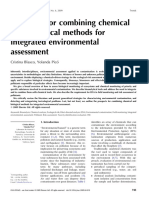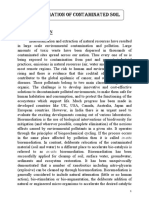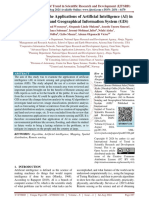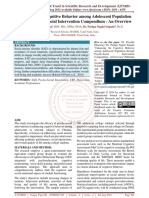Ecotoxicology-Study Aspects
Ecotoxicology-Study Aspects
Uploaded by
Editor IJTSRDCopyright:
Available Formats
Ecotoxicology-Study Aspects
Ecotoxicology-Study Aspects
Uploaded by
Editor IJTSRDOriginal Description:
Original Title
Copyright
Available Formats
Share this document
Did you find this document useful?
Is this content inappropriate?
Copyright:
Available Formats
Ecotoxicology-Study Aspects
Ecotoxicology-Study Aspects
Uploaded by
Editor IJTSRDCopyright:
Available Formats
International Journal of Trend in Scientific
Research and Development (IJTSRD)
International Open Access Journal
ISSN No: 2456 - 6470 | www.ijtsrd.com | Volume - 2 | Issue – 3
Ecotoxicology
Ecotoxicology-Study aspects
Deepthimahanthi Divya
Lecturer in Zoology, St.Anns College for Women, Hyderabad, India
ABSTRACT
Environmental contamination is not new but the transported geogreaphically
phically and in to different biota,
efforts to do something about it are originated from giving rise to compounds which have quite different
the widespread concern caused by atmospheric environmental behavior patterns and toxic properties.
testing. Ecotoxicology is concerned with the toxic
The effects of pollutants in different populations,
effects of chemical and physical agents on living
Communities of receptors; thus one has to assess the
organisms, especially on populations and
response of individual organisms to the specified
communities within defined ecosystems; it includes
the transfer pathways of those agents and their pollutant over appropriate time scale.
interactions with the environment. The results of these effects on the welfare of
ecosystems and ultimately on the biosphere is the
Keywords: Environment, Toxic chemicals, Agents
ultimate goal of this recent area-
area ecotoxicology.The
Pollution
history , Scope and needs of this ecotoxicology was
INTRODUCTION studied and reviewed by Trahut (1975).
Ecotoxicology deals with the fate and effects of Uptake of Toxicants by various organisms:
contaminants in the biosphere (Newman, 1998).
Contrary to human toxicology, which is concerned Uptake is the absorption of the substance in to t
with effects of chemicals on the individual extracellular fluid for system metabolism shown by
organism, ecotoxicology is concerned with toxic organisms, Methyl mercury is absorbed through the
effects on ecological entities, i.e. populations, gills by the fresh water fish and this respiratory uptake
communities or ecosystems. . Ecotoxicology is a is shown to be dependent on the metabolic rate.
multidisciplinary field, which
integrates toxicology and ecology , the ultimate goal For terrestrial plants, Strontium-90
Strontium uptake has been
of this approach is to be able to reveal and to predict investigated experimentally and shown that foliar
the effects of pollution within the context of all other deposition is much more important than uptake by the
environmental factors. Based on this knowledge the roots as the mechanism for contamination of the
most efficient and effective action to prevent or forage plants.
remediate any detrimental effect can be identified
identified. Retention of pollutants:
Assessment & Ultimate effect of Environment The knowledge of retention of a pollutant by
pollutants: organism is useful in determining toxic effects. It can
Chemical and physical form
orm of the pollutants released be obtained by estimation of substance remaining in
to the environment cause serious problem in the the body or by measuring the total amount excreted
environment. Transformation of the pollutants by per unit time.
abiotic and biotic processes during transport from the Excretion values are very useful for monitoring of
point of release to the receptor; so the pollutant is contaminated organisms. In case of monitoring
monitor of
@ IJTSRD | Available Online @ www.ijtsrd.com | Volume – 2 | Issue – 3 | Mar-Apr
Apr 2018 Page: 1255
International Journal of Trend in Scientific Research and Development (IJTSRD) ISSN: 2456-6470
workers contaminated by toxicants, samples of urine
and faeces. Intake of a toxicant either through
epidermis, respiratory organs or gut of terrestrial
animals depends very much upon the precise form of
the toxicant., both chemical species and the degree
and type of physical aggregation.
Conclusion:
Concepts and methods are to be developed to predict
the effects of pollutant on population communities
existing in nature. Different studies reveal that uptake
of both uptake of both toxic heavy metals and
organohalogens is most often initiated by a phase of
rapid and passive absorption of the cell wall.
References:
1) Altenburger, Rolf (2011). "Chapter 1.
Understanding combined effects for metal co-
exposure in ecotoxicology". Metal ions in
toxicology: effects, interactions,
interdependencies. pp. 1–
26. doi:10.1039/9781849732116-00001.
2) Agency, United States Environmental Protection.
"Office of Chemical Safety and Pollution
Prevention." 5 October 2011. U.S Environmental
Protection Agency. 9 December 2011.]
3) Ecology by P.D.Sharma & M.P.Arora.
4) Jamieson, A. J., Malkocs, T., Piertney, S.
B., Fujii, T. & Zhang, Z. Nat. Ecol. Evol. 1,
0051 (2017).
5) Sandwell, D. T., Muller, R. D., Smith, W. H.
F., Garcia, E. & Francis, R. Science 346, 65–67
(2014).
@ IJTSRD | Available Online @ www.ijtsrd.com | Volume – 2 | Issue – 3 | Mar-Apr 2018 Page: 1256
You might also like
- The Use of Storytelling As A Teaching Strategy in Primary School Literacy InstructionDocument5 pagesThe Use of Storytelling As A Teaching Strategy in Primary School Literacy InstructionEditor IJTSRDNo ratings yet
- Ecotoxicological Effects at ContaminatedDocument18 pagesEcotoxicological Effects at ContaminatedsoaresacpNo ratings yet
- Aquatic - Plants - and - Ecotoxicological - Assessment - in Freshwater EcosystemDocument15 pagesAquatic - Plants - and - Ecotoxicological - Assessment - in Freshwater EcosystemValeria Medali Fajardo RamosNo ratings yet
- Dokumen - Tips - Lectures in Environmental PollutionDocument53 pagesDokumen - Tips - Lectures in Environmental PollutionOmar DoskyNo ratings yet
- Flash Card History & TerminologyDocument12 pagesFlash Card History & TerminologyNur Ardini NohNo ratings yet
- 1 Reader - Introduction + Environmental Compartments - FinalDocument16 pages1 Reader - Introduction + Environmental Compartments - FinalUntalkingheroNo ratings yet
- Remocion de Contaminante Del AguaDocument8 pagesRemocion de Contaminante Del AguaAnahi PalominoNo ratings yet
- Prospects For Combining Chemical and Biological Methods For Integrated Environmental AssessmentDocument13 pagesProspects For Combining Chemical and Biological Methods For Integrated Environmental AssessmentJhon Derly Sarria OspinaNo ratings yet
- Physiological and Behavioral Responses of Land Molluscs As Biomarkers For Pollution Impact Assessment - A ReviewDocument60 pagesPhysiological and Behavioral Responses of Land Molluscs As Biomarkers For Pollution Impact Assessment - A ReviewHami BenNo ratings yet
- The Impacts of Environmental Pollutants On Microalgae and CyanobacteriaDocument124 pagesThe Impacts of Environmental Pollutants On Microalgae and CyanobacteriaDeepakNo ratings yet
- Can Proteomics Contribute To Biomonitoring of Aquatic PollutionDocument12 pagesCan Proteomics Contribute To Biomonitoring of Aquatic PollutionM GolloNo ratings yet
- Pollution Indicators and Pollution Control StrategiesDocument46 pagesPollution Indicators and Pollution Control StrategiesUZMA KHANNo ratings yet
- Sandford 2005Document7 pagesSandford 2005Omar DaherNo ratings yet
- Toxicity Testing, Aquatic: M Sobanska, R Cesnaitis, and B Versonnen, European Chemicals Agency, Helsinki, FinlandDocument5 pagesToxicity Testing, Aquatic: M Sobanska, R Cesnaitis, and B Versonnen, European Chemicals Agency, Helsinki, FinlandMarcos AlbertoNo ratings yet
- Journal of Theoretical Biology: Qihua Huang, Hao Wang, Mark A. LewisDocument19 pagesJournal of Theoretical Biology: Qihua Huang, Hao Wang, Mark A. Lewisyuukanishi6881No ratings yet
- WorkDocument4 pagesWorkAkshitaNo ratings yet
- Environmental Toxicology Lecture Notes Part1Document39 pagesEnvironmental Toxicology Lecture Notes Part1Okky Assetya P100% (3)
- Environmental Chemistry AssignmentDocument11 pagesEnvironmental Chemistry AssignmentRao ZeeshanNo ratings yet
- Ekotoksikologi Kelautan PDFDocument18 pagesEkotoksikologi Kelautan PDFMardia AlwanNo ratings yet
- GE15 - SIM Week 6-7Document4 pagesGE15 - SIM Week 6-7Althea Nicole QuindoNo ratings yet
- Review On BioremediationDocument15 pagesReview On BioremediationNicolas Porras CarvajalNo ratings yet
- 1 s2.0 S1532045622001818 MainDocument17 pages1 s2.0 S1532045622001818 Mainrodriguez.neuroscienceNo ratings yet
- Emerging PollutantsDocument10 pagesEmerging Pollutantsalexandra.hurtadoNo ratings yet
- Eduarda Et Al (2023) Removal of Organic Contaminants in Water Bodies or Wastewater by Microalgae of The Genus Chlorella - A ReviewDocument11 pagesEduarda Et Al (2023) Removal of Organic Contaminants in Water Bodies or Wastewater by Microalgae of The Genus Chlorella - A ReviewAldy KiatNo ratings yet
- Microplastic Pollution - Chemical Characterization and Impact On Wildlife - PMCDocument35 pagesMicroplastic Pollution - Chemical Characterization and Impact On Wildlife - PMCOdey DanielNo ratings yet
- Atmospheric Pollution ResearchDocument11 pagesAtmospheric Pollution ResearchUsman AliNo ratings yet
- Envr AssgnmntDocument4 pagesEnvr AssgnmntMohommed AamirNo ratings yet
- MAGNUSSON Et Al., 2012 PDFDocument10 pagesMAGNUSSON Et Al., 2012 PDFBruna Perissini LopesNo ratings yet
- Emerging Pollutants Part I Occurrence, Fate and TransportDocument42 pagesEmerging Pollutants Part I Occurrence, Fate and Transporteva carvalhoNo ratings yet
- 2021 New Trend in The Extraction of Pesticides Applying MicroextractionDocument28 pages2021 New Trend in The Extraction of Pesticides Applying MicroextractionSITI NUR AFIQAH MAHAZANNo ratings yet
- FIsh Bioaccumulation Biomarker ETP2003 PDFDocument93 pagesFIsh Bioaccumulation Biomarker ETP2003 PDFOriol Kanu del BesòsNo ratings yet
- Pesticidas en LarvasDocument9 pagesPesticidas en LarvasCAROLNo ratings yet
- Research Project Zoology BSC Last YearDocument23 pagesResearch Project Zoology BSC Last Yearjogipalk92No ratings yet
- Ecological Risk Assessment: UNEP/IPCS Training Module No. 3 Section CDocument46 pagesEcological Risk Assessment: UNEP/IPCS Training Module No. 3 Section CFlorea RalucaNo ratings yet
- Emerging Contaminants NewDocument8 pagesEmerging Contaminants Newusmanqazi395No ratings yet
- Bioindicators in Aquatic Environment and Their SignificanceDocument7 pagesBioindicators in Aquatic Environment and Their SignificanceTRUNG TRUNGNo ratings yet
- Toxicity Tests To Check Water Quality: Review PaperDocument4 pagesToxicity Tests To Check Water Quality: Review PaperwubshetNo ratings yet
- Tigini-2019-Wastewater-Agar As A Selection EnvDocument8 pagesTigini-2019-Wastewater-Agar As A Selection EnvEduard-Marius LungulescuNo ratings yet
- Bioindicador Ventajas y DesventajasDocument13 pagesBioindicador Ventajas y DesventajasCaty FannyNo ratings yet
- 2.euglypha RotundaDocument10 pages2.euglypha RotundaScarivannyNo ratings yet
- 2021 - Rodrigues - Microplastics and Plankton - Knowledge From Laboratory and Field Studies To Distinguish Contamination From PollutionDocument14 pages2021 - Rodrigues - Microplastics and Plankton - Knowledge From Laboratory and Field Studies To Distinguish Contamination From PollutionLim Kok PingNo ratings yet
- Why Short-Term Bioassays Are Not Meaningful-Effects of A Pesticide (Imidacloprid) and A Metal (Cadmium) On Pea Aphids (Acyrthosiphon Pisum Harris)Document8 pagesWhy Short-Term Bioassays Are Not Meaningful-Effects of A Pesticide (Imidacloprid) and A Metal (Cadmium) On Pea Aphids (Acyrthosiphon Pisum Harris)ArtemNo ratings yet
- Environmental Toxicology - Chapter 2Document40 pagesEnvironmental Toxicology - Chapter 2abriloplusNo ratings yet
- Environmental Fate and Exposure Neonicotinoids and FipronilDocument33 pagesEnvironmental Fate and Exposure Neonicotinoids and Fipronilfefegcar1No ratings yet
- Determination of Pesticides and Their DegradationDocument18 pagesDetermination of Pesticides and Their DegradationtsalotkarNo ratings yet
- Bioaccumulation of Different Organic Micropollutants in Fishes and Its ToxicologicalDocument18 pagesBioaccumulation of Different Organic Micropollutants in Fishes and Its ToxicologicalIJRASETPublicationsNo ratings yet
- ToxicologyDocument21 pagesToxicologybensonhsesNo ratings yet
- Rathi Et Al 2020 - Contaminantes Emergentes Amb Aquaticos Remoçao ReviewDocument79 pagesRathi Et Al 2020 - Contaminantes Emergentes Amb Aquaticos Remoçao ReviewgddezorziNo ratings yet
- Biomarkers For Pollution in Caged Mussels From Three Reservoirs in Bulgaria A Pilot StudyDocument14 pagesBiomarkers For Pollution in Caged Mussels From Three Reservoirs in Bulgaria A Pilot StudyNida Ul Haq FaisalNo ratings yet
- A Review On Emerging Water Contaminants and The Application of Sustainable Removal TechnologiesDocument14 pagesA Review On Emerging Water Contaminants and The Application of Sustainable Removal TechnologiesCiel Ronquillo0% (1)
- Microplastics Addressing Ecological Risk Through Lessons Learned - Kristian SybergDocument9 pagesMicroplastics Addressing Ecological Risk Through Lessons Learned - Kristian SybergTrydawNo ratings yet
- Ecotoxicology: Common Environmental ToxicantsDocument2 pagesEcotoxicology: Common Environmental ToxicantsasdaNo ratings yet
- 1 s2.0 S0013935123023046 MainDocument34 pages1 s2.0 S0013935123023046 MainkendlpNo ratings yet
- Chapter I (LPE 409 2021)Document12 pagesChapter I (LPE 409 2021)afia rahmanNo ratings yet
- Environmental Law Lecture Notes 1 PDFDocument96 pagesEnvironmental Law Lecture Notes 1 PDFMohamed Ali67% (3)
- Ecotoxicology BEGUM 2012Document156 pagesEcotoxicology BEGUM 2012javier chavezNo ratings yet
- Sonochemical Degradation of Pesticides in AqueousDocument28 pagesSonochemical Degradation of Pesticides in AqueousMarinetteNo ratings yet
- Environmental Law ProjectDocument21 pagesEnvironmental Law ProjectSiddhant MathurNo ratings yet
- Project BioremediationDocument45 pagesProject BioremediationAnil MishraNo ratings yet
- The Web of Life: Understanding Ecology and Our Place in ItFrom EverandThe Web of Life: Understanding Ecology and Our Place in ItNo ratings yet
- A Study On Educational Discrimination in The Chinese WorkplaceDocument5 pagesA Study On Educational Discrimination in The Chinese WorkplaceEditor IJTSRDNo ratings yet
- Case of Benign Prostatic Hyperplasia by Homoeopathy A Case ReportDocument4 pagesCase of Benign Prostatic Hyperplasia by Homoeopathy A Case ReportEditor IJTSRDNo ratings yet
- Barriers Faced by People With Visual Impairment in Securing Employment in The City of Manzini, EswatiniDocument10 pagesBarriers Faced by People With Visual Impairment in Securing Employment in The City of Manzini, EswatiniEditor IJTSRDNo ratings yet
- Green Victimolgy An IntroductionDocument8 pagesGreen Victimolgy An IntroductionEditor IJTSRDNo ratings yet
- Instructional Humor and Its Compliance Gained During Virtual LearningDocument35 pagesInstructional Humor and Its Compliance Gained During Virtual LearningEditor IJTSRDNo ratings yet
- Significance of Sthanika Chikitsa in Kaphaja Yonivyapath A Review ArticleDocument5 pagesSignificance of Sthanika Chikitsa in Kaphaja Yonivyapath A Review ArticleEditor IJTSRDNo ratings yet
- Assessing The Impact of Information Communication Technology ICT in The Teaching and Learning of Social Studies in Senior High Schools in Ghana A Case of Eastern Region SchoolsDocument25 pagesAssessing The Impact of Information Communication Technology ICT in The Teaching and Learning of Social Studies in Senior High Schools in Ghana A Case of Eastern Region SchoolsEditor IJTSRDNo ratings yet
- Joyful Collaborative Teaching For Junior High School Araling Panlipunan 10Document18 pagesJoyful Collaborative Teaching For Junior High School Araling Panlipunan 10Editor IJTSRDNo ratings yet
- Utilization of Copper Slag and Hypo Sludge As Alternative Material in ConcreteDocument4 pagesUtilization of Copper Slag and Hypo Sludge As Alternative Material in ConcreteEditor IJTSRDNo ratings yet
- Exploring The Ethnomedicinal Potential of Black Turmeric Curcuma Caesia Roxb. A Comprehensive ReviewDocument6 pagesExploring The Ethnomedicinal Potential of Black Turmeric Curcuma Caesia Roxb. A Comprehensive ReviewEditor IJTSRDNo ratings yet
- An Assessment of The Applications of Artificial Intelligence AI in Remote Sensing and Geographical Information System GISDocument7 pagesAn Assessment of The Applications of Artificial Intelligence AI in Remote Sensing and Geographical Information System GISEditor IJTSRDNo ratings yet
- Assessment of The Nigerian Television Authority NTA, Abuja, Signal Strength With Atmospheric ComponentsDocument6 pagesAssessment of The Nigerian Television Authority NTA, Abuja, Signal Strength With Atmospheric ComponentsEditor IJTSRDNo ratings yet
- The Burden of Care A Systematic Review of Parental Stress in Families of Children With Intellectual DisabilitiesDocument8 pagesThe Burden of Care A Systematic Review of Parental Stress in Families of Children With Intellectual DisabilitiesEditor IJTSRDNo ratings yet
- Moral Ramifications and DifficultiesDocument7 pagesMoral Ramifications and DifficultiesEditor IJTSRDNo ratings yet
- The Impact of Domestic Abuse On Children Prenatal To 5 Years Implications For Social Work PracticeDocument10 pagesThe Impact of Domestic Abuse On Children Prenatal To 5 Years Implications For Social Work PracticeEditor IJTSRDNo ratings yet
- Factors Affecting Individuals To Adopt Green Banking Empirical Evidence From The UTAUT ModelDocument9 pagesFactors Affecting Individuals To Adopt Green Banking Empirical Evidence From The UTAUT ModelEditor IJTSRDNo ratings yet
- Role of Libraries in The Context of Research and Educational InstitutionsDocument3 pagesRole of Libraries in The Context of Research and Educational InstitutionsEditor IJTSRDNo ratings yet
- Learning Management Systems and Self Directed Learning in Higher Education Institutions in CameroonDocument26 pagesLearning Management Systems and Self Directed Learning in Higher Education Institutions in CameroonEditor IJTSRDNo ratings yet
- Enhancing The Cognitive Behavior Among Adolescent Population Through Psycho Social Intervention Compendium An OverviewDocument3 pagesEnhancing The Cognitive Behavior Among Adolescent Population Through Psycho Social Intervention Compendium An OverviewEditor IJTSRDNo ratings yet
- Comparative Analysis of Plaque Retention Between Conventional Brackets and Self Ligating Brackets Using Plaque IndexDocument4 pagesComparative Analysis of Plaque Retention Between Conventional Brackets and Self Ligating Brackets Using Plaque IndexEditor IJTSRDNo ratings yet
- Review Article On VranaDocument8 pagesReview Article On VranaEditor IJTSRDNo ratings yet
- Role of Language Teacher in SocietyDocument3 pagesRole of Language Teacher in SocietyEditor IJTSRDNo ratings yet
- Comparative Effects of Lime and Banana Leaf Ash On Engineering Property of SoilDocument4 pagesComparative Effects of Lime and Banana Leaf Ash On Engineering Property of SoilEditor IJTSRDNo ratings yet
- Practical Attempts at Building Smart Courts With The Assistance of Generative Artificial IntelligenceDocument5 pagesPractical Attempts at Building Smart Courts With The Assistance of Generative Artificial IntelligenceEditor IJTSRDNo ratings yet
- Emerging Trends On OER'Document3 pagesEmerging Trends On OER'Editor IJTSRDNo ratings yet
- Global Burden of Disease GBD An IntroductionDocument8 pagesGlobal Burden of Disease GBD An IntroductionEditor IJTSRDNo ratings yet
- Student Centered Teaching Design and Practical Effect Analysis of Big Data Computing and Storage CourseDocument7 pagesStudent Centered Teaching Design and Practical Effect Analysis of Big Data Computing and Storage CourseEditor IJTSRDNo ratings yet
- Comparing Development of Human Right Values in Secondary School Teachers With Relation To Locality and Gender of Aurangabad DistrictDocument6 pagesComparing Development of Human Right Values in Secondary School Teachers With Relation To Locality and Gender of Aurangabad DistrictEditor IJTSRDNo ratings yet
- Enhancing The Properties of Expansive Soil Stabilized With Sisal Fibre and Fly AshDocument7 pagesEnhancing The Properties of Expansive Soil Stabilized With Sisal Fibre and Fly AshEditor IJTSRDNo ratings yet
- L51 - BRG - International Environmental Treaties To Reduce Air Pollution and GHG EmissionsDocument52 pagesL51 - BRG - International Environmental Treaties To Reduce Air Pollution and GHG EmissionsDimpi Shah100% (1)
- Solid Waste Management PDFDocument3 pagesSolid Waste Management PDFKing ArancesNo ratings yet
- GroundWaterPollutioninIndia AReviewDocument5 pagesGroundWaterPollutioninIndia AReviewALL IN ONE SAM VINESNo ratings yet
- GlobalizationDocument136 pagesGlobalizationEnnio Piano100% (3)
- Spill Prevention PlanDocument3 pagesSpill Prevention PlanAngelie MoralesNo ratings yet
- MPCB 2016Document113 pagesMPCB 2016rishabh devNo ratings yet
- Manila Water PDFDocument38 pagesManila Water PDFJe QuinsayasNo ratings yet
- Tunisia - Nawara Southern Tunisian Gas Pipeline - ESIA Executive SummaryDocument28 pagesTunisia - Nawara Southern Tunisian Gas Pipeline - ESIA Executive SummaryodeinatusNo ratings yet
- The State of Anti Plastic Campaign,' The Law, Its Effects and ImplementationDocument6 pagesThe State of Anti Plastic Campaign,' The Law, Its Effects and ImplementationBiren samal67% (3)
- Pollution Under Control Certificate: Form 59Document1 pagePollution Under Control Certificate: Form 59vijay.princeverma786No ratings yet
- Earth Science: Module EIGHTDocument15 pagesEarth Science: Module EIGHTCris Zener JulveNo ratings yet
- Results and DiscussionDocument11 pagesResults and DiscussionJV Valdez RollodaNo ratings yet
- M C Mehta Vs Union of IndiaDocument9 pagesM C Mehta Vs Union of IndiapriyanshuNo ratings yet
- Chap 012Document45 pagesChap 012palak32100% (6)
- BMW Apollo DraftDocument9 pagesBMW Apollo DraftSabin LalNo ratings yet
- SWM SQ1Document4 pagesSWM SQ1Jessica BubanNo ratings yet
- Manufacturing Industries: One Mark QuestionsDocument7 pagesManufacturing Industries: One Mark QuestionsaryanNo ratings yet
- Environmental HealthDocument4 pagesEnvironmental HealthXris Loidz GanadoNo ratings yet
- Swatch: Waste Destruction / Decomposition SystemDocument9 pagesSwatch: Waste Destruction / Decomposition SystemMridupaban DuttaNo ratings yet
- Environmental Law Reflection JournalDocument16 pagesEnvironmental Law Reflection JournalDeep SinghviNo ratings yet
- Solid Waste ManagementDocument10 pagesSolid Waste Managementaadilze1285No ratings yet
- Syllabus: Cambridge O Level Environmental ManagementDocument22 pagesSyllabus: Cambridge O Level Environmental Managementmstudy123456No ratings yet
- JNPC-Ramky - Presentation5-06-08Document33 pagesJNPC-Ramky - Presentation5-06-08api-3711757100% (1)
- Proposal For Air ControlDocument4 pagesProposal For Air ControlNatasha SinghNo ratings yet
- Sludge BrickDocument19 pagesSludge BrickKeerthu SivakumarNo ratings yet
- Basura Ko Responsibilidad Ko1Document2 pagesBasura Ko Responsibilidad Ko1Jenny Rose BatalonNo ratings yet
- Crumple A Watershed: Science Topics Process Skills Grade LevelDocument13 pagesCrumple A Watershed: Science Topics Process Skills Grade LevelAcrizerNo ratings yet
- Apar Silvassa LubesDocument8 pagesApar Silvassa LubesROOPDIP MUKHOPADHYAYNo ratings yet
- Evm BioDocument11 pagesEvm BioKaab MullaNo ratings yet






















































































































